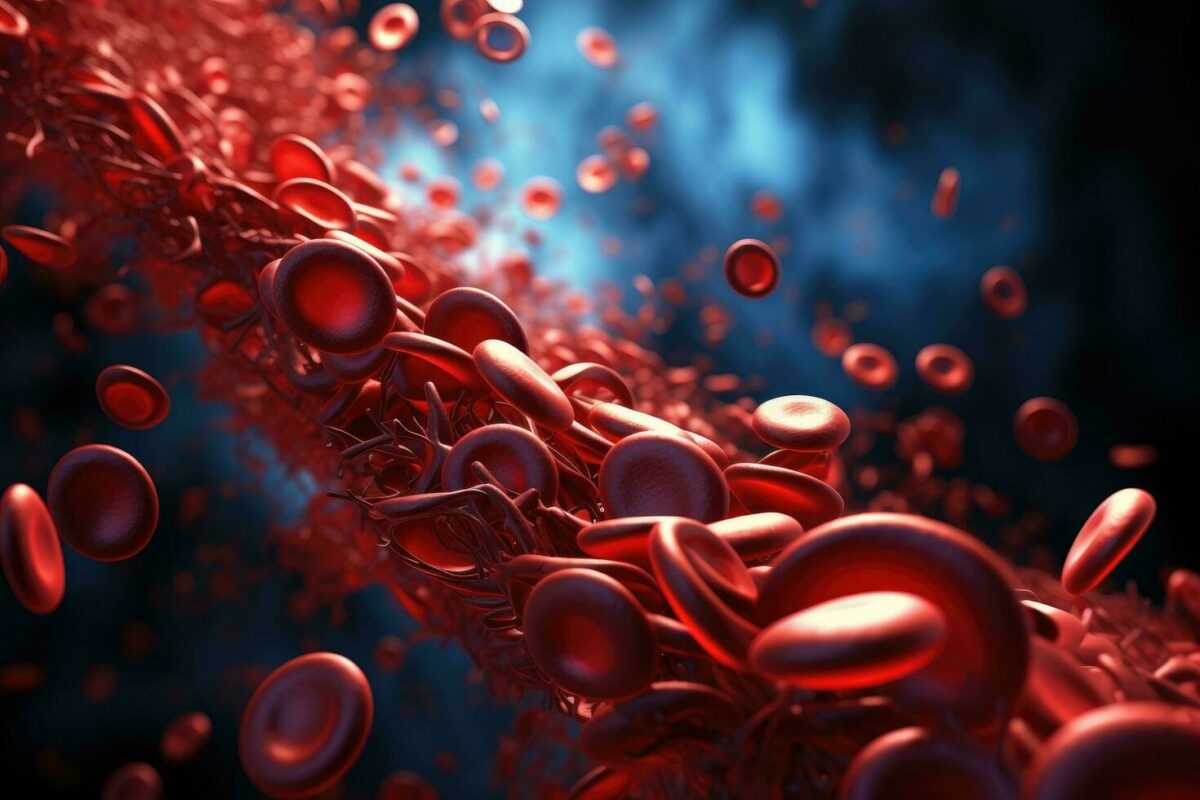Do blood thinners cause ED? If you’re experiencing ED while taking these medications, you might blame the drugs. However, the real answer is more complicated.
Blood thinners are medications that do exactly what their name implies—they thin your blood so it doesn’t form blood clots in your blood vessels. These medications are usually prescribed to people with a high risk of having a heart attack or stroke.
If you’re experiencing ED symptoms while using blood thinners and you’re wondering if these medications are to blame, read on to discover what effect they have on erectile function.
What Are Blood Thinners?
Blood thinners are medications that prevent a blood clot from forming or prevent existing blood clots from getting bigger so that blood flows freely through your blood vessels.
Blood clot formation is a normal process that the body needs during wound healing to allow the healing process to begin.
However, blood clots forming in the blood vessels and arteries can cause heart attacks and lead to an increased risk of strokes due to blocking blood flow.
People who are prescribed blood thinners include people who have:
- Recently had heart surgery or other surgical procedures
- Cardiovascular disease
- An increased risk of heart attacks or stroke
- Cardiovascular health issues
- Irregular heart rhythm
- Deep vein thrombosis
- There are two types of blood thinners:
- Anticoagulants
- Antiplatelets
Anticoagulants are the most common type of blood thinner. These medications slow the formation of blood clots in people who suffer from clotting problems by interfering with clotting-related proteins in the blood. Examples of anticoagulants include enoxaparin, heparin, and warfarin.
Antiplatelet drugs stop your platelets from sticking together to form clots. Platelets are disc-shaped pieces of blood cells that help form blood clots to assist with wound healing. The most common antiplatelet medication is aspirin. Other examples include dipyridamole, ticlopidine, and clopidogrel (Plavix).
Side Effects of Using Blood Thinners To Prevent Blood Clots
Although erectile dysfunction might occur with some types of blood thinners, there are more common side effects. The biggest risk of taking either type of blood thinner is excessive bleeding.
- Besides excessive bleeding, other side effects include:
- Nausea
- Low counts of blood cells
- Diarrhea
- Signs of heavy bleeding when taking blood thinners include:
- Bruising
- Red or brown-colored urine
- Persistent bleeding from the gums or nose
- Red or black bowel movements
- Heavier than normal menstrual bleeding
- A cut that keeps bleeding
- A severe headache or painful stomach
- Coughing up something red
- Bumping your head
- Dizziness or weakness
You should always seek medical attention right away if you have any of these symptoms or risk factors for bleeding, such as falling and hitting your head.
Blood Thinners and Erectile Dysfunction
If you’re experiencing erectile dysfunction while taking blood thinners, the problem is likely not the blood thinners. Most blood thinners do not cause erectile dysfunction, although there are some exceptions.
A review of medical studies published in 2017 found that a class of blood thinner drugs known as thienopyridine derivatives, especially clopidogrel, increase the risk of erectile dysfunction, lower libido, and reduce sexual function.1
In some cases, certain blood thinner drugs can have other effects on erectile function. Rarely, men taking warfarin suffer from priapism, a prolonged erection that can be harmful if not treated fast enough.1
Beneficial Effects of Blood Thinners on Sexual Activity
In most cases, blood thinners don’t cause erectile dysfunction. Blood thinners are meant to improve blood flow and men with erectile dysfunction usually have poor blood flow. So the blood-thinning action of the drugs may help erectile function rather than worsen ED.
One study found that 100 mg of aspirin once per day significantly improved erectile function in men who had vasculogenic erectile dysfunction.2
Vasculogenic erectile dysfunction is the most common type of ED. Men with this type of ED need to increase blood flow to the penis.
In the study, men given aspirin experienced improved scores on the International Index of Erectile Function (IIEF-EF) and an improvement in the sexual encounter profile (SEP) compared with men taking the placebo.
What Is The Cause of ED When Taking Blood Thinners?
Another consideration? Most men who are on blood thinners have one or more health conditions that are linked to erectile dysfunction.
For example, men with cardiovascular disease, heart problems, and diabetes—all health issues associated with ED—are often on blood thinners.
Experiencing ED is considered a warning sign for heart disease and ED symptoms often show up years in advance of coronary problems.
Other Medications That Can Cause Erectile Dysfunction
A lot of men who are on blood thinners are also taking other prescription medications that are associated with erectile dysfunction. For example, high blood pressure medications like beta-blockers or diuretics may cause ED in some men.
Talk to your healthcare provider about a treatment plan to treat high blood pressure that won’t interfere with sexual intercourse.
Other oral medications that may cause ED include:
- Anti-anxiety drugs and antidepressants
- Epilepsy drugs
- Opioids
- Muscle relaxants
- Parkinson’s disease drugs
- Prostate drugs
It could be these other medications for underlying health conditions rather than the blood thinners themselves that are to blame for your ED.
What Causes Erectile Dysfunction?
There are physical causes and psychological causes of erectile dysfunction.
Physical risk factors for erectile dysfunction can include:
- High blood pressure
- Diabetes
- Aging
- Lifestyle factors like weight gain, poor diet, and lack of exercise
- Heart problems
- Prostate cancer treatment
- A side effect of certain medications
For many of these physical reasons for ED, the root cause boils down to problems with blood vessel health and reduced blood flow to penile blood vessels. Most of these conditions lead to poor circulation that deprives the penis of the blood necessary for healthy erections.
Psychological causes of ED include:
- Depression
- Sexual performance anxiety
- Relationship problems
- Low self-esteem
Can You Take Blood Thinners with ED Medications?
If you’d like to treat erectile dysfunction using a prescribed ED medication and you’re taking a blood thinner to minimize the risk of blood clots, talk with your healthcare provider to make sure you can take both at the same time. There are no known interactions between the two types of drugs, but you’ll want to make certain that the medical reason why you are taking blood thinners in the first place doesn’t preclude you from taking ED pills.
Some of the drugs you are taking for those underlying conditions may be contraindicated with ED medications. For example, if you’re taking nitrates for an underlying heart condition, you should not take drugs for ED.
FAQs About Blood Thinners and Erectile Dysfunction
Can blood thinners cause erectile dysfunction?
With most blood thinners, the answer is no. However, a review of medical studies published in 2017 found that a class of blood thinner drugs known as thienopyridine derivatives, especially clopidogrel (Plavix), can increase the risk of erectile dysfunction. Aspirin, on the other hand, may improve sexual function.
What can I take for ED while on blood thinners?
There are no known interactions between medications for ED and blood thinners. So it should be safe to take ED pills while on a blood thinner drug.
Always discuss your medications with your healthcare provider, in case you are taking other drugs that might be contraindicated with ED medications.
As far as non-drug ED treatment options, there is an increased risk for bleeding when using penile vacuum devices as an ED treatment while taking blood thinners. Men taking blood thinners also are at an increased risk for bleeding while undergoing penile injections for treating ED. You should use these erectile dysfunction treatments with caution if you’re taking blood thinners.
What are The side effects of blood thinners for men?
The most common side effect of blood thinners is excessive bleeding, which can happen internally such as after you hit your head or externally like when a wound won’t stop bleeding. Blood thinners can also cause nausea, diarrhea, and low blood cell counts.
In one review of published studies, researchers found that clopidogrel (Plavix) was linked to poor erection quality.


